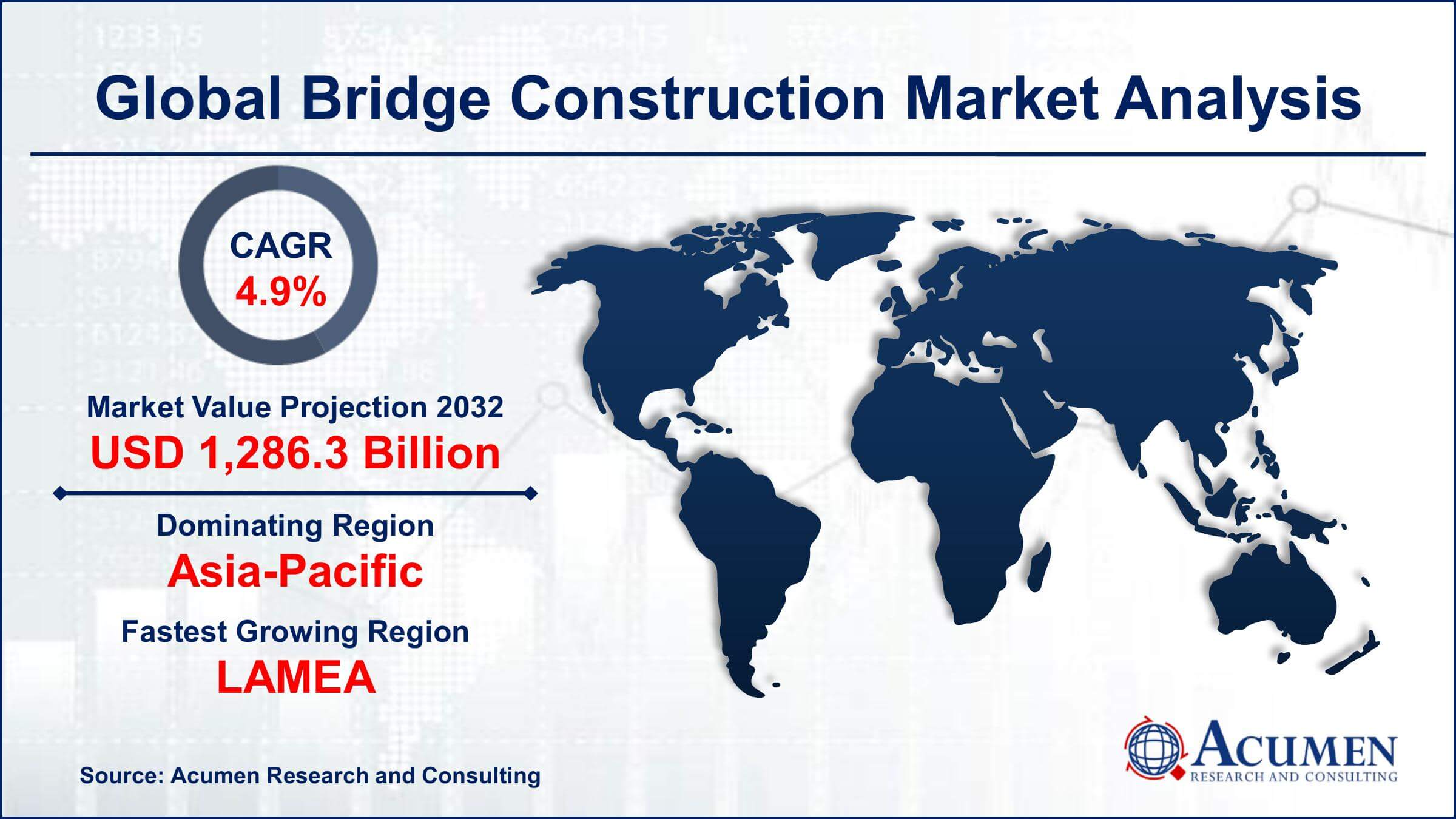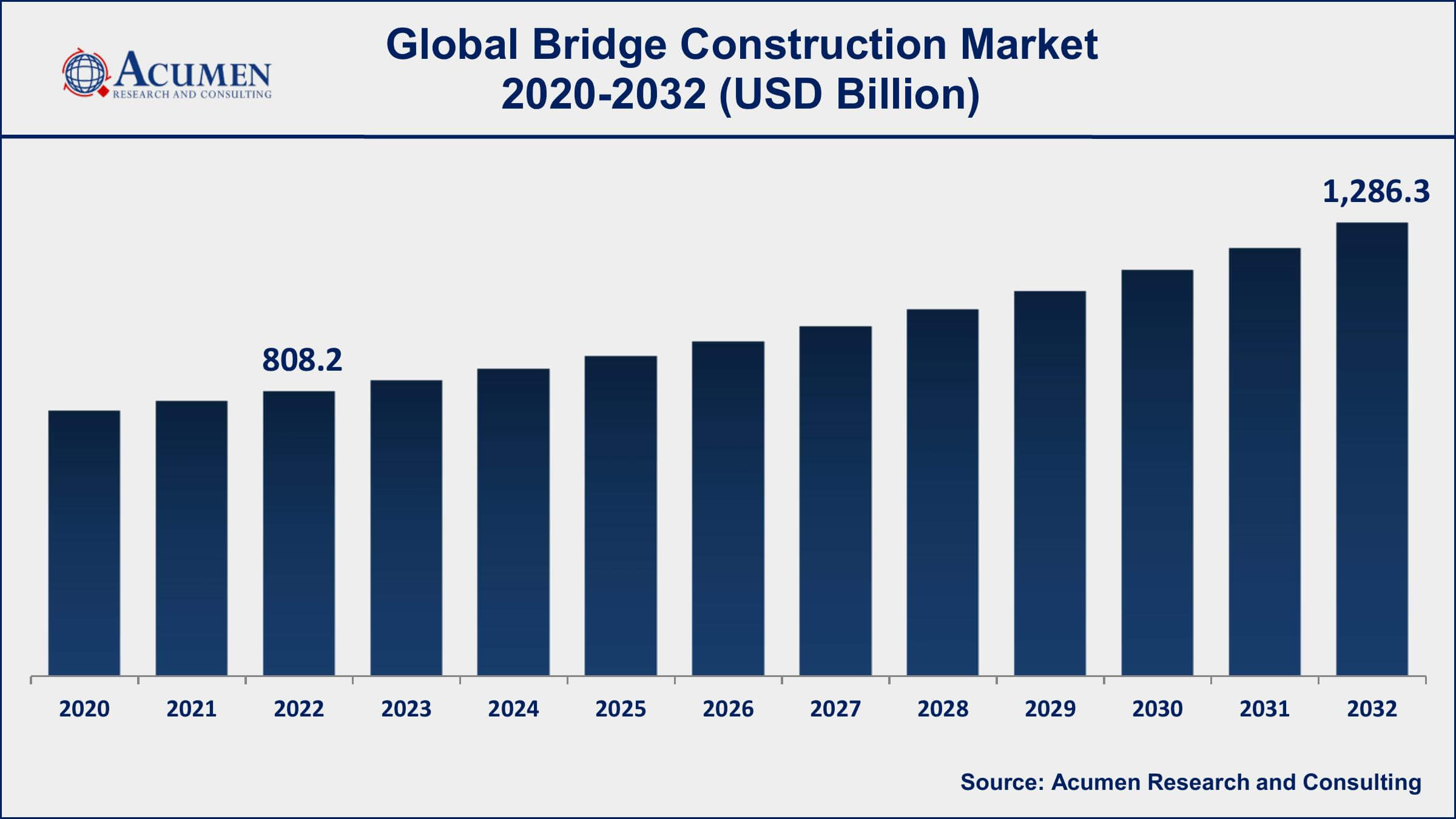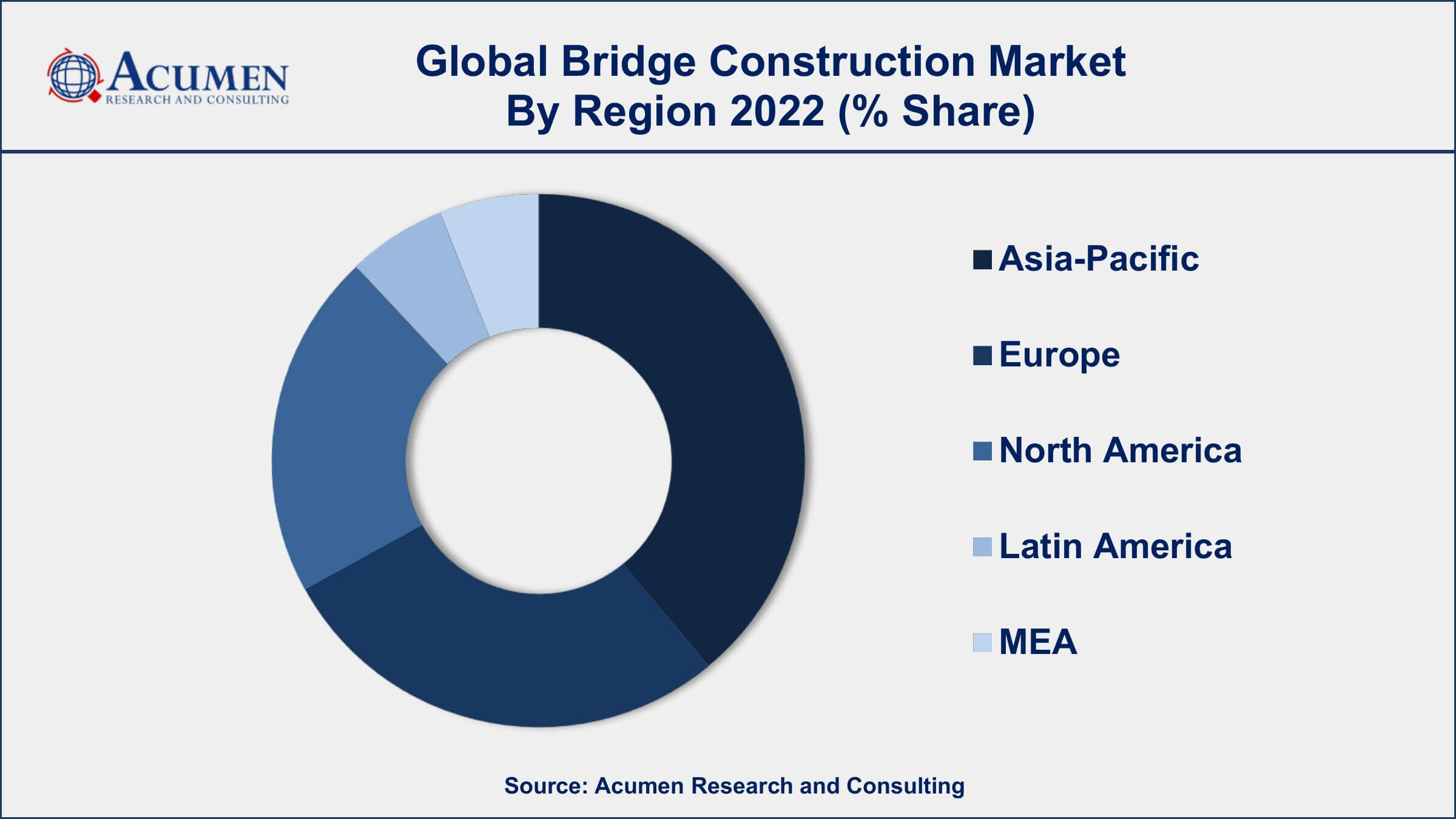Bridge Construction Market Size - Global Industry, Share, Analysis, Trends and Forecast 2023 - 2032
Published :
Report ID:
Pages :
Format :
Bridge Construction Market Size - Global Industry, Share, Analysis, Trends and Forecast 2023 - 2032
Report Coverage
- Industry Dynamics
- Market Size and Forecast Data
- Segment Analysis
- Competitive Landscape
- Regional Analysis with a Niche Focus on Country-Level Data
- High Level Analysis - Porter's, PESTEL, Value Chain, etc.
- Company Profiles of Key Players
- Option to Customize the Report As Per Your Specific Need
Request Sample Report
The Global Bridge Construction Market Size accounted for USD 808.2 Billion in 2022 and is projected to achieve a market size of USD 1,286.3 Billion by 2032 growing at a CAGR of 4.9% from 2023 to 2032.
Bridge Construction Market Highlights
- Global Bridge Construction Market revenue is expected to increase by USD 1,286.3 Billion by 2032, with a 4.9% CAGR from 2023 to 2032
- Asia-Pacific region led with more than 36% of Bridge Construction Market share in 2022
- LAMEA Bridge Construction Market growth will record a CAGR of more than 5.6% from 2023 to 2032
- By type, the beam bridge segment has recorded more than 37% of the revenue share in 2022
- By material, the concrete segment has generated of about 44% of the revenue share in 2022
- Urbanization and population growth driving demand for improved transportation infrastructure, drives the Bridge Construction Market value

Bridge construction is the process of designing and constructing structures that span physical obstacles like rivers, valleys, or roads, connecting two separate areas. These structures play a crucial role in facilitating transportation and connectivity, enabling the efficient movement of people, vehicles, and goods. Bridge construction involves various stages, including planning, design, foundation work, substructure and superstructure construction, and finishing touches. The choice of materials, engineering techniques, and architectural designs can vary depending on factors like the location's geography, traffic volume, environmental impact, and budget considerations. As technology advances, bridge construction has evolved from traditional methods to more innovative approaches, such as precast concrete elements, cable-stayed designs, and even 3D printing.
The market growth for bridge construction has been on an upward trajectory in recent years, driven by urbanization, population growth, and the need to replace or upgrade aging infrastructure. Increasingly, governments and private enterprises around the world are investing in modernizing their transportation networks, which includes building new bridges and rehabilitating existing ones. Furthermore, the demand for resilient and environmentally friendly infrastructure has led to the integration of sustainable materials and practices in bridge construction. The growth of the market is also influenced by technological advancements that enhance the efficiency, safety, and durability of bridge structures.

Global Bridge Construction Market Trends
Market Drivers
- Urbanization and population growth driving demand for improved transportation infrastructure
- Aging bridges necessitating repair, replacement, and modernization efforts
- Government investments in large-scale infrastructure projects
- Technological advancements enhancing construction efficiency and safety
- Environmental consciousness promoting sustainable bridge designs and materials
Market Restraints
- Budget constraints limiting funding for extensive bridge projects
- Complex regulatory and permitting processes delaying construction timelines
Market Opportunities
- Integration of smart technologies for bridge monitoring and maintenance
- Development of innovative materials for longer-lasting and cost-effective bridges
Bridge Construction Market Report Coverage
| Market | Bridge Construction Market |
| Bridge Construction Market Size 2022 | USD 808.2 Billion |
| Bridge Construction Market Forecast 2032 | USD 1,286.3 Billion |
| Bridge Construction Market CAGR During 2023 - 2032 | 4.9% |
| Bridge Construction Market Analysis Period | 2020 - 2032 |
| Bridge Construction Market Base Year | 2022 |
| Bridge Construction Market Forecast Data | 2023 - 2032 |
| Segments Covered | By Type, By Material, By Application, And By Geography |
| Regional Scope | North America, Europe, Asia Pacific, Latin America, and Middle East & Africa |
| Key Companies Profiled | China Communications Construction Company (CCCC), Vinci SA, ACS Group, Bouygues Construction, Samsung C&T Corporation, Skanska AB, Bechtel Corporation, Grupo ACS, China Road and Bridge Corporation (CRBC), Larsen & Toubro Limited (L&T), Fluor Corporation, and Kiewit Corporation |
| Report Coverage |
Market Trends, Drivers, Restraints, Competitive Analysis, Player Profiling, Covid-19 Analysis, Regulation Analysis |
Bridge construction is the specialized process of designing, planning, and building structures that span physical obstacles such as rivers, valleys, highways, or railways. These structures serve as vital links, enabling the seamless movement of people, vehicles, and goods between previously separated areas. Bridge construction involves a combination of engineering, architecture, and construction principles to create safe, durable, and efficient crossings. The process includes tasks such as site assessment, foundation work, substructure and superstructure construction, and final finishes.
The application of bridge construction is wide-ranging and essential for modern society's infrastructure needs. Bridges facilitate connectivity and economic growth by reducing travel times and enabling transportation networks to expand. They play a significant role in urban development, allowing cities to expand across natural barriers and easing congestion within urban areas. In rural settings, bridges provide access to remote regions, promoting economic development and improving quality of life. Additionally, bridge construction has applications in disaster response, helping restore connectivity after natural events like floods or earthquakes. The diverse nature of bridge designs, from simple beam bridges to complex cable-stayed or suspension bridges, caters to a variety of contexts, making bridge construction a pivotal aspect of modern infrastructure development.
The bridge construction market has been experiencing substantial growth due to a combination of factors that are reshaping the global infrastructure landscape. Rapid urbanization and population growth have led to increased demand for efficient transportation networks, driving governments and private entities to invest in new bridge projects. Moreover, the need to replace aging infrastructure has spurred a wave of bridge rehabilitation and reconstruction initiatives. This has created a robust market environment for construction companies, engineering firms, and related industries. Technological advancements play a pivotal role in this growth trajectory. Innovations in construction methods, materials, and design techniques have significantly improved the efficiency and sustainability of bridge projects.
Bridge Construction Market Segmentation
The global Bridge Construction Market segmentation is based on type, material, application, and geography.
Bridge Construction Market By Type
- Beam Bridge
- Arch Bridge
- Truss Bridge
- Cable-Stayed Bridge
- Suspension Bridge
- Others
According to the bridge construction industry analysis, the beam bridge segment accounted for the largest market share in 2022. Beam bridges, also known as girder bridges, are characterized by their horizontal beams supported by piers or abutments at each end. This design allows for efficient spanning of relatively short to medium distances, making them a popular choice for various urban and rural infrastructure projects. One of the key factors contributing to the growth of the beam bridge segment is its adaptability to different transportation needs. Whether for roadways, pedestrian pathways, or light rail systems, beam bridges offer a practical solution for spanning gaps where a more complex design might not be required. Additionally, advancements in construction materials, such as the use of high-strength concrete and innovative steel alloys, have further enhanced the load-bearing capabilities and durability of beam bridges.
Bridge Construction Market By Material
- Concrete
- Steel
- Composite Material
In terms of materials, the concrete segment is expected to witness significant growth in the coming years. Concrete is a primary material choice for bridge construction due to its ability to withstand heavy loads, harsh environmental conditions, and long-term wear and tear. This segment's growth is driven by advancements in concrete technology, such as the development of high-performance and self-healing concrete, which further enhance the material's properties. One of the key factors contributing to the growth of the concrete segment is the increasing demand for resilient and long-lasting infrastructure. Concrete bridges offer the advantage of requiring minimal maintenance over their lifespan compared to other materials. Moreover, innovations like precast concrete elements and advanced formwork techniques have streamlined construction processes, reducing project timelines and costs.
Bridge Construction Market By Application
- Railway
- Road & Highway
According to the bridge construction market forecast, the road & highway segment is expected to witness significant growth in the coming years. Roads and highways are the lifelines of economic activity, connecting urban centers, facilitating trade, and promoting regional development. As populations grow and urban areas expand, the demand for well-designed and strategically placed bridges to overcome geographic obstacles like rivers and valleys becomes paramount. One of the key factors fueling the growth of the road and highway segment is the focus on reducing traffic congestion and improving connectivity. Governments and transportation authorities are investing in new bridge projects to alleviate bottlenecks, enhance traffic flow, and accommodate the growing number of vehicles. Additionally, the push towards sustainable transportation solutions has led to the integration of pedestrian walkways, cycling lanes, and even public transit components within these bridge designs, catering to diverse modes of transportation.
Bridge Construction Market Regional Outlook
North America
- U.S.
- Canada
Europe
- U.K.
- Germany
- France
- Spain
- Rest of Europe
Asia-Pacific
- India
- Japan
- China
- Australia
- South Korea
- Rest of Asia-Pacific
Latin America
- Brazil
- Mexico
- Rest of Latin America
The Middle East & Africa
- South Africa
- GCC Countries
- Rest of the Middle East & Africa (ME&A)

Bridge Construction Market Regional Analysis
Asia-Pacific's dominance in the bridge construction market can be attributed to a combination of rapid urbanization, massive infrastructure investments, and a burgeoning need for connectivity. As the world's most populous region, Asia-Pacific faces substantial demands for efficient transportation networks to accommodate the movement of people and goods. Governments across the region are responding to these demands by embarking on ambitious infrastructure projects, including the construction of bridges that facilitate seamless connectivity. The region's economic growth and urban expansion have led to an increased emphasis on upgrading and expanding transportation infrastructure. Mega-cities are emerging, and existing cities are experiencing significant population growth, prompting governments to invest in new bridge construction and the rehabilitation of existing structures. Moreover, Asia-Pacific's diverse geography, including expansive coastlines, rivers, and challenging terrains, creates a necessity for bridges to overcome natural barriers. The availability of skilled labor, cost-effective construction practices, and access to raw materials have further contributed to the dominance of the Asia-Pacific region in the bridge construction market.
Bridge Construction Market Player
Some of the top bridge construction market companies offered in the professional report include China Communications Construction Company (CCCC), Vinci SA, ACS Group, Bouygues Construction, Samsung C&T Corporation, Skanska AB, Bechtel Corporation, Grupo ACS, China Road and Bridge Corporation (CRBC), Larsen & Toubro Limited (L&T), Fluor Corporation, and Kiewit Corporation.
Frequently Asked Questions
What was the market size of the global bridge construction in 2022?
The market size of bridge construction was USD 808.2 Billion in 2022.
What is the CAGR of the global bridge construction market from 2023 to 2032?
The CAGR of bridge construction is 4.9% during the analysis period of 2023 to 2032.
Which are the key players in the bridge construction market?
The key players operating in the global market are including China Communications Construction Company (CCCC), Vinci SA, ACS Group, Bouygues Construction, Samsung C&T Corporation, Skanska AB, Bechtel Corporation, Grupo ACS, China Road and Bridge Corporation (CRBC), Larsen & Toubro Limited (L&T), Fluor Corporation, and Kiewit Corporation.
Which region dominated the global bridge construction market share?
Asia-Pacific held the dominating position in bridge construction industry during the analysis period of 2023 to 2032.
Which region registered fastest CAGR from 2023 to 2032?
LAMEA region exhibited fastest growing CAGR for market of bridge construction during the analysis period of 2023 to 2032.
What are the current trends and dynamics in the global bridge construction industry?
The current trends and dynamics in the bridge construction industry include urbanization and population growth driving demand for improved transportation infrastructure, aging bridges necessitating repair, replacement, and modernization efforts, and government investments in large-scale infrastructure projects.
Which material held the maximum share in 2022?
The concrete material held the maximum share of the bridge construction industry.


